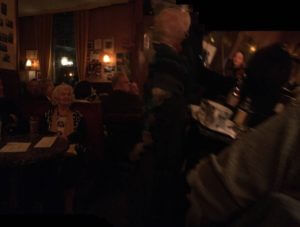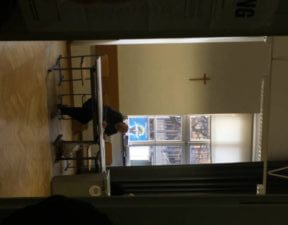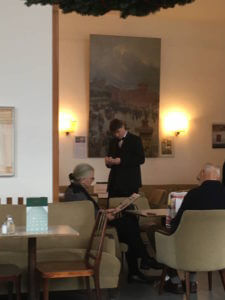Just before the trial, The New York Times ran an in-depth piece titled, "Foes of Russia Say Child Pornography Is Planted to Ruin Them:
"CAMBRIDGE, England — His indomitable will steeled by a dozen years in the Soviet gulag, decades of sparring with the K.G.B. and a bout of near fatal heart disease, Vladimir K. Bukovsky, a tireless opponent of Soviet leaders and President Vladimir V. Putin of Russia, is not a man easily put off his stride.
"But he got knocked sideways when British police officers banged on the front door of his home on a sedate suburban street here early one morning while he lay sick in bed and informed him that they had “received information about forbidden images” in his possession.
'“It was all very bizarre and disturbing,” Mr. Bukovsky said. “This is not normally the language of a free society,” he added, recalling how his old K.G.B. tormentors used to hound him and his friends over texts and photographs declared forbidden by the Soviet authorities.
"The images sought by the British police, however, had nothing to do with politics but involved child pornography, a shocking offense in any jurisdiction. The officers hauled away a clunky desktop computer from Mr. Bukovsky’s study — a chaos of books and papers dusted with cigarette ash — and a broken computer from his garage.
"In April last year, the veteran Soviet dissident, a onetime confidant of Margaret Thatcher, finally found out what was going on: The Crown Prosecution Service announced that he faced five charges of making indecent images of children, five charges of possession of indecent images of children and one charge of possession of a prohibited image
"The case was supposed to go to court in May in Cambridge but, after Mr. Bukovsky, 73, entered a not-guilty plea it was delayed until Dec. 12. This followed a prosecution request for more time to review an independent forensic report on what had been found on Mr. Bukovsky’s computers and how an unidentified third party had probably put it there.
'“The whole affair is Kafkaesque,” Mr. Bukovsky said in an interview. “You not only have to prove you are not guilty but that you are innocent.” He insisted that he was the victim of a new and particularly noxious form of an old K.G.B. dirty trick known as kompromat, the fabrication and planting of compromising or illegal material.
'Old-style kompromat featured doctored photographs, planted drugs, grainy videos of liaisons with prostitutes hired by the K.G.B., and a wide range of other primitive entrapment techniques.
'Today, however, kompromat has become allied with the more sophisticated tricks of cybermischief-making, where Russia has proved its prowess in the Baltic States, Georgia and Ukraine. American intelligence agencies also believe that Russia used hacked data to hurt Hillary Clinton and promote Donald J. Trump in the U.S. presidential election, according to senior officials in the Obama administration.
"Russia’s cyberwarriors serve a multitude of goals, including espionage, the disruption of vital infrastructure — as happened in Ukraine last year when nearly a quarter of a million people lost electricity after a cyberattack on three regional energy companies — the discrediting of foes and the shaping of public opinion through the spread of false information.
"Hacking is not only a good way to get real information, like the emails of the D.N.C., but a relatively easy and usually untraceable way to plant fake information. For example, when unidentified hackers last year broke into the computers of a government research center in Lithuania, they stole nothing, but planted bogus reports on its website that the country’s stoutly pro-American president had worked as an escort and K.G.B. informer while a student in Leningrad during the Soviet era.
"A similar break-in affecting the Lithuanian military’s website replaced a bland announcement about a coming NATO exercise with a fake statement that presented the exercise as part of a plan to annex Kaliningrad, a Russian exclave on the Baltic Sea, and join it with Lithuania, a member of NATO.
"The supposed NATO plan outlined in the phony text closely mimicked methods used by Moscow in 2014 to annex Crimea and stir up unrest in eastern Ukraine, including the seizure of military posts and police stations and calls for the establishment of the Kaliningrad People’s Republic.
"Written in faulty Lithuanian, the statement was “immediately obvious as a fake,” said Rimtautas Cerniauskas, the director of Lithuania’s National Cyber Security Center, which was set up last year in response to increased alarm over Russian aggression.
"But, he added, the stunt nonetheless succeeded in distracting cyberdefense staff members from their normal work for days and in spreading a lie that, though immediately exposed, polluted discussion about NATO.
"“I don’t believe in aliens, but if you see enough articles about aliens visiting Earth, you start to think ‘Who knows, maybe the government is hiding something,’” Mr. Cerniauskas said.
"Seemingly, no target is too small to warrant attention, no attack too petty. Trained to believe that the ends always justify the means, Russian security service operatives “have sick minds,” Mr. Bukovsky said. “They live in a virtual reality.”
"This blurring of all boundaries between truth and falsehood in the service of operational needs has created a climate in Russia in which even the most serious and grotesque accusations, like those involving pedophilia, are simply a currency for settling scores. Mr. Bukovsky is far from the only one fending off such allegations.
"Yoann Barbereau, the French director of the Alliance Française in the Siberian city of Irkutsk, has been struggling since early last year to defend himself against charges that he posted child pornography on a website for Russian mothers. His lawyers, pointing to evidence that his computer was tampered with after his arrest, believe that the material was planted by local security service officers to punish Mr. Barbereau for an extramarital romance with a woman connected to a powerful local official. In September, after months under house arrest, Mr. Barbereau fled.
"Konstantin Rubakhin, an environmental activist who lives in exile in Lithuania, also got a visit from police officers looking for child pornography. Mr. Rubakhin speculated that that raid, in June last year, may have been part of an effort to derail his application for political asylum or his work for the EU-Russia Civil Society Forum, a research group that investigates corruption. In the end, the Lithuanian police dropped the case.
"Getting someone labeled a suspected pedophile has the added benefit of fitting “perfectly with the Kremlin’s line that human rights activists are all just degenerates,” said Vytis Jurkonis, a Lithuanian human rights activist who works with Russian exiles.
"Russia has denied any involvement in all of these incidents. “Of course they do,” scoffed Linas Linkevicius, Lithuania’s foreign minister. “They never have anything to do with anything that is going on in the world,” he said, describing Russian hackers, whether working directly for the state or as freelance vandals, “as part of their weapons system.”
'“They have very efficient hybrid warfare means,” he added.
"In the case of Mr. Bukovsky and the others involving pornography stored — or planted — on the computers of Kremlin critics, the high degree of deniability offered by the shadows of cyberspace has left the accused struggling to salvage their reputations.
'“To use a technical term, you are completely screwed,” said Jeffrey Carr, the head of Taia Global, an American cybersecurity company, and the author of a book on cyberwarfare. “If something like this is sponsored by the Russian government, or any government or anyone with sufficient skill, you are not going to be successful. It is terrible.”
"Russia first flexed its cybermuscle publicly in 2007 with a blitzkrieg attack across a broad front in Estonia, a Baltic nation often at odds with Moscow. The computer systems there of the police, military, banks, media and government offices faced a lengthy barrage of superfluous requests designed to crash their networks, a tactic known as a distributed denial-of-service attack.
'Taimar Peterkop, the director general of Estonia’s Information System Authority, which watches over the core pillars of the country’s highly digitalized economy and government, said that after that early assault the cybermischief linked to Russia has only expanded in both range and sophistication.
'“Nowadays it seems they want to show they are everywhere,” Mr. Peterkop said. “Like flying bombers close to our and other countries’ borders, they perhaps simply want to show they have an important global footprint. It is almost as if they want to be seen, or maybe we are just responding better.”
'Last year’s assault on Ukraine’s energy system involved far more elaborate tools than those used in the 2007 distributed denial-of-service attacks on Estonia and were the first known successful effort by Russia or its proxies to knock out vital civilian infrastructure with hackers worming their way into control rooms.
'Robert Lee, the director of Dragos Security, a cybersecurity company in Maryland, who helped investigate the electricity shutdown in Ukraine, said that identifying the culprits would “never be certain” but that “when we look at tradecraft, capabilities and motive of the group involved, we can come to a high-confidence assessment that the group was Russian-based and a medium-confidence assessment that there were members in the government that knew this was going to happen.”
'This gray zone of uncertainty has been seized on by Russia as proof that it is the victim of “Russophobic” hysteria over its role in cyberspace. It has also left Mr. Bukovsky — and others caught in what they believe are Moscow-orchestrated kompromat traps — at the mercy of Western police and courts that demand hard evidence, not guesswork and accusation from defendants.
'No matter what the court in Britain decides, Mr. Bukovsky has already had his reputation — and, by association, that of other critics of the Kremlin — trashed in Russia.
'Inside Russia, kompromat has featured for years in political and business disputes. Under President Boris N. Yeltsin in the 1990s, it was a dirty game played by both the Kremlin and its foes but, under Mr. Putin, compromising videos and other embarrassing material invariably target only the Kremlin’s opponents.
'Before becoming president at the end of 1999, Mr. Putin played a prominent role in a particularly spectacular example of this Russian specialty. As head of the Federal Security Agency, or F.S.B., in 1997, Mr. Putin won the trust of Mr. Yeltsin by helping to destroy the career of Russia’s prosecutor general, Yury Skuratov, who, after starting an investigation into Kremlin corruption, was disgraced on national television by the broadcast of a video that showed a man who looked like him in bed with two young women.
'Mr. Putin certified in public that the man in the video, widely believed to have been arranged and then filmed by the F.S.B., was indeed the prosecutor general. Mr. Skuratov resigned. The corruption investigation ended. A grateful Mr. Yeltsin named Mr. Putin prime minister and then president.
'For the Kremlin’s supporters, the verdict on Mr. Bukovsky is already in. On learning of the charges against him, Margarita Simonyan, the editor in chief of the state-funded television outlet RT, posted a sneering message on Twitter: “The Pedophile Plan: rape a child, sign up in the opposition, emigrate, expose the flaws of the motherland and all will be well. Or not.”
'The idea that Europeans and Russian opponents of the Kremlin are sexual deviants with a taste for pedophilia is a strange but recurring theme in Russian propaganda. The Russian ex-wife of a Norwegian man gained wide attention in state media, for example, with fabricated claims, made after she lost a child custody battle in Norway, that her former husband dressed up their 4-year-old son in a “Putin costume” and raped him.
'Foes of the Kremlin have sometimes picked up the same ugly club and used it to beat Mr. Putin, as did Alexander V. Litvinenko, a former K.G.B. agent who died in London in 2006 from poisoning by a highly toxic radioactive isotope. Four months before his death, which a British inquiry ruled was probably state-sponsored murder approved by Mr. Putin, Mr. Litvinenko published an article that, without any evidence, asserted that the Russian president was himself a pedophile.
'Mr. Bukovsky, who was a close friend of Mr. Litvinenko, said he had strongly urged him not to publish. “I was very angry with him,” Mr. Bukovsky recalled, noting that in many ways Mr. Litvinenko, despite his ferocious hostility toward the Kremlin, still had the mind-set of a security officer and “could not understand the difference between truth and operational information.”
'On the “dark web,” an area of the internet that requires special software and authorization codes to enter, suspected Russian hackers openly offer to plant evidence of pedophilia as a way to destroy an enemy.
'“I’ll do anything for money,” promised an advertisement placed by a hacker who offered to ruin “your opponents, business or private persons you don’t like. I can ruin them financially and or get them arrested, whatever you like.” Boasting that it was possible to destroy both individuals and businesses, the hacker added, “If you want someone to get known as a child porn user, no problem.” He gave a price, denominated in Bitcoins, of around $600 per job.
'Paulo Shakarian, the chief executive officer of IntelliSpyre and the director of the Cyber-Socio Intelligent Systems Laboratory at Arizona State University, said his team had analyzed the advertisement and concluded that it was probably posted by a Russian (or at least a Russian-speaking) hacker. He said the price was in the normal range of what hackers demand for character assassination.
'No matter what the court in Britain decides, Mr. Bukovsky has already had his reputation — and, by association, that of other Kremlin’s critics — trashed in Russia. Russian state television, in a report on the case, described the dissident as “a lover of child porn.”
'Mr. Bukovsky complained that European countries that expect clarity and follow rigid procedures easily fall prey to the dirty tricks of a regime that excels in hiding its tracks and creating confusion. “They are very good at using the West against the West,” he said.
'"A Russian dissident," they wrote, "accused of making and possessing thousands of indecent photographs of children said he was doing research and that some of those involved looked to be enjoying themselves, a court has heard.
'"Vladimir Bukovsky, who sat in court in a wheelchair, has gone on trial accused of having accessed still and video images over 15 years, some of which were being downloaded at the point of his arrest in 2014.
'"The 73-year-old told police he had become curious at the end of the 1990s about issues involving control of and censorship of the Internet and decided to look into what was available online, prosecutor Will Carter said.
'"The pensioner, who was living alone in Cambridge when he was arrested, said it had become something of a hobby, which he told no-one else about."Mr Carter said: "What he said was that his initial curiosity turned into a hobby rather like stamp-collecting.""Bukovsky denies five counts of making indecent images of children, five of possessing indecent images of children and one of possessing a prohibited image of a child. That's the article you want to see, if you're in Bukovsky's position. Unfortunately, it went downhill from there.
After the first day of the trial, things looked quite bad:
Vladimir Bukovsky, the veteran Soviet era dissident, said downloading more than 20,000 indecent images of children was a hobby "like stamp collecting", a court heard.Bukovsky, 73, who sat in court in a wheelchair, is on trial accused of having accessed still and video images over 15 years, some of which were being downloaded at the point of his arrest in 2014.He told police he had become curious at the end of the 1990s about issues involving control of, and censorship of the Internet and decided to look into what was available online, prosecutor Will Carter said.The pensioner, who was living alone in Cambridge when he was arrested, said it had become something of a hobby, which he told no-one else about.
Mr Carter said: "What he said was that his initial curiosity turned into a hobby rather like stamp-collecting."
Bukovsky denies five counts of making indecent images of children, five of possessing indecent images of children and one of possessing a prohibited image of a child.A handful of his supporters were in court.'"The defendant is considered a hero by some who support democratic reform in Russia, but has another side, the jury was told."Mr Carter said: "The prosecution say that there was another side to this man which was far from laudable, an extensive interest in real children really being abused."Owing to Bukovsky's poor health, the trial was adjourned before his lawyers were able to explicate his defence.Bukovsky was then hospitalized with pneumonia. His trial was postponed and the jury discharged. His lawyer, Robert Brown, said he had been "in poor health for a long time" and "continues to assert his innocence. Mr. Bukovsky hasn't yet had any opportunity to present his side of the case. It's therefore extremely important the case isn't prejudged."
I agree it's important, but it is hard to do based on what we now know. I can't imagine a defense that would cause me to change my mind about the evidence I've so far seen. But I'll wait, of course, before drawing formal conclusions. It looks pretty bad to me, though.
Yesterday I received an e-mail from one of his close friends:
Unfortunately, I can’t shed any more light on Vladimir’s matter. I did go to Cambridge yesterday with great difficulty getting there and back because the railways are in chaos. Unfortunately, two people not known to me arrived at the same time, and this would have made any confidential conversation impossible, on top of which I was only able to stay less than an hour before rushing back to Cambridge station in order to be able to get home. Quite honestly, I don’t know whether I would have started interrogating him, because what I saw was an old, very sick man who looks positively drained and pitiable. He is pumped full of steroids and antibiotics, which can’t be too easy on an already frail constitution. I did manage to grab a quick word with P. but all I got from him is that there will be a retrial when the doctors judge that V is well enough to appear in court, and that won’t be any time soon. In any case, the matter will be heard again from scratch (new legal team, new jury, etc.) so if I’m reading the tea leaves correctly, this is going to drag on and on well into next year. How feasible that is I have no idea: all we’ve heard so far is the presentation of the prosecution, and if V.’s legal team thinks his chances of winning are good they must have a basis for this.My own feelings are that whatever the outcome, it will still be an ignominious end to the life of a very remarkable man. I can only say that if the accusations are true, it is something neither I nor anyone else has detected, not by the slightest word or action to raise even the ghost of such suspicions: these things always leak out."Then again, who knows what goes on in the darkest corners of someone else’s mind, no matter how well you may think you know them? We all have things we would rather the world at large did not know about.
So here we are -- waiting for Bukovsky's recovery so that we can hear his defense. Unsure whether anything said in his defense could mitigate what's already been said against him in court. The only option is to wait.
A sad and disturbing story.






 oncrete number of refugees we can accept, feed, house, and educate until their country is safe or until they enter the workforce. That number is four-tenths of a percent of our population per annum. We will pay for this by making thesespecific cuts to our budget, and raising taxes by this amount. People who wish privately to sponsor more refugees are welcome to do so, so long as the refugees in question pass security and background checks, for which you as the sponsor must pay. Asylum applications must be processed at the border to ensure that no one enters the country on an illegitimate claim. Here is the plan. It is a specific plan.” It was the vagueness of the official response, I suspect, that made people lose their minds.
oncrete number of refugees we can accept, feed, house, and educate until their country is safe or until they enter the workforce. That number is four-tenths of a percent of our population per annum. We will pay for this by making thesespecific cuts to our budget, and raising taxes by this amount. People who wish privately to sponsor more refugees are welcome to do so, so long as the refugees in question pass security and background checks, for which you as the sponsor must pay. Asylum applications must be processed at the border to ensure that no one enters the country on an illegitimate claim. Here is the plan. It is a specific plan.” It was the vagueness of the official response, I suspect, that made people lose their minds.  There are no hordes; Austria has not been overrun.
There are no hordes; Austria has not been overrun.
 The French presidential election begins in April 2017, and if no candidate wins the first round, it will go to the second and final round in May. François Hollande looks, at this point, like the walking dead. His poll numbers are almost comically low — the opposition could triumph by running any reasonably healthy goat. His party will hold primary elections in January; they may put him out of their misery and select another candidate, or he may decide not to run.
The French presidential election begins in April 2017, and if no candidate wins the first round, it will go to the second and final round in May. François Hollande looks, at this point, like the walking dead. His poll numbers are almost comically low — the opposition could triumph by running any reasonably healthy goat. His party will hold primary elections in January; they may put him out of their misery and select another candidate, or he may decide not to run. This makes him sound like a rare economic liberal in an age of statism and populism: He calls himself a “Thatcherite,” and defended economic liberalism as common sense: “I’m tagged with an [economically] liberal label in the same way one would paint crosses on the doors of lepers in the middle ages. But I’m just a pragmatist.”
This makes him sound like a rare economic liberal in an age of statism and populism: He calls himself a “Thatcherite,” and defended economic liberalism as common sense: “I’m tagged with an [economically] liberal label in the same way one would paint crosses on the doors of lepers in the middle ages. But I’m just a pragmatist.”